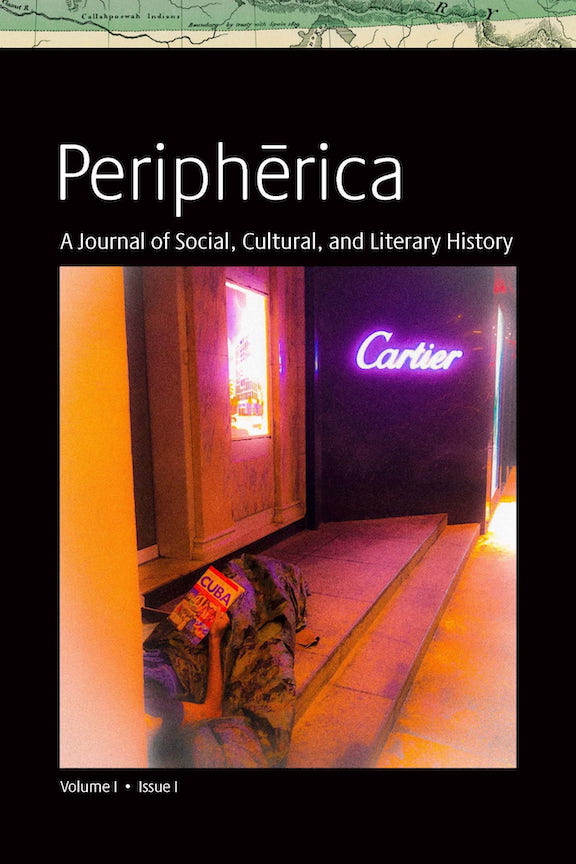Solitude and the Consent of Language: Marosa di Giorgio and Emily Dickinson.
DOI:
https://doi.org/10.5399/uo/peripherica.1.1.8Resumen
“Solitude and the Consent of Language: Marosa di Giorgio and Emily Dickinson,” examines how the Uruguayan, Marosa di Giorgio, draws from Emily Dickinson’s poetry to imagine the mind’s solitude as a recuperation of linguistic and signifying freedom within the acute context of imposed consent during the Uruguayan dictatorship. I suggest that the question at work within both poet’s oeuvre has to do with how poetic form might access the tension between what each understood as the mind’s solitude, that is, its individual interpretive processes, and the pulls of communal life, which include governmental, juridical, narrative and pedagogical systems, as they are negotiated through language. In addition to being an interdisciplinary analysis that brings together the fields of philosophy, U.S., and Latin American letters, this paper calls attention to two women writers who are rarely considered together within literary and cultural studies.Citas
Aarsleff, Hans. “Locke’s Influence.” The Cambridge Companion to Locke. Ed. Vere Chappell. Cambridge: Cambridge UP, 1999, 252–289.
Achugar, Hugo. Textos para decir María. Caracas: Monte Avila Editores, 1976.
Barthes, Roland. The Pleasure of the Text. Translation by Richard Miller. New York: Hill and Wang, 1975.
Benedetti, Mario. Inventario uno: poesía completa 1950–1985. Buenos Aires: Editorial Sudamérica, 2001.
Benítez Pezzolano, Herbert. “Marosa Di Giorgio en lasbocas de la luz.” Interpretación y eclipse: Ensayos sobre literature uruguaya. Montevideo: Librería Linardi y Risso, 2000, 51-61.
Berenguer, Amanda. “Comunicado,” Poesía rebelde uruguaya: 1967–1971. Ed. Hugo Achugar. Montevideo: Biblioteca de marcha, 1971. 33.
Bravo, Luis. Voz y palabra: historia transversal de la poesía uruguaya 1950–1973. Montevideo: Estuario Editora, 2012.
Dickinson, Emily. The Complete Poems of Emily Dickinson. Ed. Thomas. H. Johnson. Boston: Little Brown and Company, 1961.
Di Giorgio, Marosa. Los papeles salvajes: Edición definitiva de la obra poética reunida. Ed. Daniel García Helder. Buenos Aires: Adriana Hidalgo, 2008.
---, “Emily y Emily.” Pasajes de un memorial: Al abuelo toscano Eugenio Médici. Ed. Leonardo Garet. Salto: Centro Comercial e Industrial de Salto, 2006. 158-159. First published in Posdata, December, 1995.
Echavarren, Roberto. “Marosa Di Giorgio, Última poeta del Uruguay.” Revista Iberoamericana, 1992 July-Dec; 58 (160-161): 1103-15.
Heller-Roazen, Daniel. Echolalias: On the Forgetting of Language. New York: Zone Books, 2005.
Locke, John. Second Treatise of Government. Indianápolis: Hacket, 1980.
---, An Essay Concerning Human Understanding. Ed., Intro., and Notes by Kenneth P. Winkler. Indianapolis: Hackett Publishing Company, Inc., 1996.
Miller, Cristanne. Emily Dickinson: A Poet’s Grammar. Cambridge, MA: Harvard UP, 1995.
Pallares, Ricardo. “Marosa Di Giorgio.” Tres mundos en la lírica uruguaya actual: W. Benavides, J. Arbeleche, M. Di Giorgio. Montevideo: Ediciones de la Banda Oriental, 1992, 43-58.
Porzecanski, Teresa. “Fiction and Friction in the Imaginative Narrative Written inside Uruguay.” Repression, Exile, and Democracy: Uruguayan Culture. Ed. Saúl Sosnowsky and Louise B. Popkin. Trans. Louise B. Popkin. Durham: Duke University Press, 1993, 213-223.
---, “Marosa Di Giorgio: Uruguay’s Sacred Poet of the Garden.” A Dream of Light and Shadow: Portraits of Latin American Women Writers. Ed. and Intro. Marjorie Agosín. Albuquerque: University of New Mexico Press, 1995, 303-314.
Olivera-Williams, María Rosa.“La imaginación salvaje: Marosa di Giorgio.” Revista Iberoamericana, Vol. LXXI, Núm. 211, Abril–Junio 2005, 403–416.



